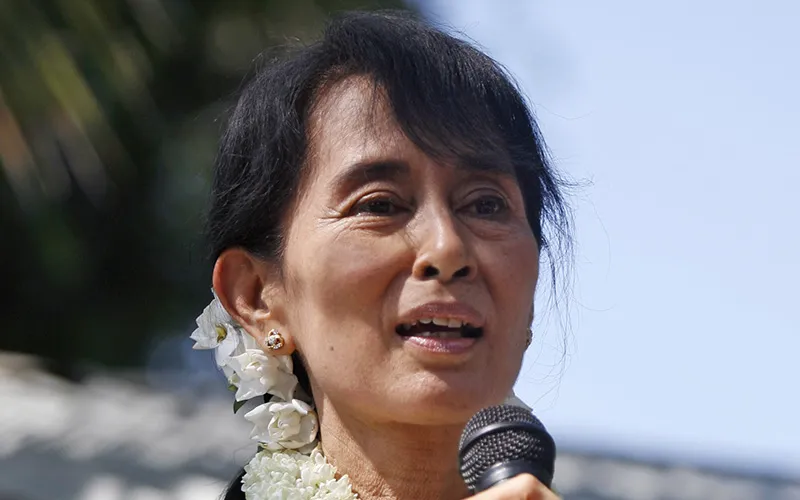-
CENTRES
Progammes & Centres
Location
As Myanmar's general elections draws nearer and at a time when China's relations with Myanmar's military-backed government comes under increasing strains in recent months, Beijing seems to be stepping up its multiple-engagement strategy with key political actors to prepare itself for any eventuality post-elections.

As Myanmar's general elections, slated to be held later this year, draws nearer and at a time when China's relations with Myanmar's military-backed government under President Thein Sein comes under increasing strains in recent months, Beijing seems to be stepping up its multiple-engagement strategy with Myanmar's key political actors to prepare itself for any eventuality post-elections.
Leading a delegation of her party, the National League for Democracy (NLD), Myanmar's opposition leader Aung San Suu Kyi is on a five-day visit to China this week at the invitation of China Community Party (CCP). Questions on why the sudden visit or why now and what is the significance of the visit are being raised both inside and outside the country.
Suu Kyi's visit comes at a time when relationship between the two countries is at its lowest ebb in recent years. Since Myanmar initiated democratic reforms in 2011, Beijing's influence in Myanmar has been fading in the wake of Naypyitaw's growing engagement with the West, particularly, the US.
Though China remains the largest trading partner of Myanmar, Beijing has been unhappy with President Thein Sein for the suspension of two major Chinese-backed projects - a cooper mine and a hydro project in northern Myanmar.
Tensions in China-Myanmar ties escalated in the recent months over Myanmar's army offensives against ethnic rebels along the border involving an ethnic Han Chinese called Kokangs that has resulted in influx of refugees into China's Yunnan Province and killing of four Chinese citizens in a bombing by Myanmar armed forces that strayed into the Chinese side.
China's "multi-faceted diplomacy"
Over the past few years since Myanmar's initiated democratic reforms in 2011, the CCP has been engaging different political parties of Myanmar under its party-to-party exchange with the aim to strengthen ties with key political stakeholders in Myanmar.
During Myanmar's military-rule, China had to deal with only one political player - the junta. After reforms, Beijing adopted a new strategy to engage all the political actors of Myanmar since in the changed political environment the country has been driven by diverse political forces.
This is Suu Kyi's first visit to China, but not for her party. In fact, a 12 member delegation that included NLD Central Executive Committee members, NLD member of parliaments and provincial NLD representatives had visited China in May 2013.
In April this year, speaker of Myanmar's parliament and chairman of the ruling party, the Union Solidarity and Development Party (USDP), Thura U Shwe Mann visited China and met senior leaders of the Chinese leadership including President Xi Jinping.
According to Xinhua news agency, President Xi called for high-level contacts and personnel exchanges between the CCP and the USDP and discussed Chinese "One Belt, One Road" initiative and the need to maintain border peace during his meeting with Shwe Mann. A proposal for a railway line connecting the Bay of Bengal with China's Yunnan province has been stalled and Beijing has been pushing for Myanmar government's approval.
President Xi may have discussed similar issues and called for better party-to-party ties with Suu Kyi during their meeting yesterday. Although there has been no detail about the agenda of the visit, the Chinese leadership might have expressed its desire to see the revival of the suspended projects.
Earlier in April 2013, China hosted a delegation led by Myanmar's ruling party, which included five other political parties. Interestingly, NLD was not included in that delegation. In the same month, the CCP also invited Rakhine Nationalities Development Party. This is an indication that China is not only cultivating the bigger players but also smaller ethnic political parties.
Another Myanmar political parties' delegation travelled to Kunming, Yunnan Province in June 2014 at the invitation of the CCP that included leaders from the Arakan National Party (ANP) and the National Democratic Force (NDF).
A common factor in most of these party visits is a stop at Kunming, Yunnan province, where Suu Kyi's delegation is also expected to visit. For China, Yunnan province is at the heart of its Myanmar strategy. Yunnan province borders northern Myanmar and has huge stake in the overall China-Myanmar ties as it positions itself as the gateway to Myanmar.
Of late, developments along the border have emerged as a source of tension between the two countries due to the conflicts involving Myanmar army and ethnic rebels. From the Chinese perspective, deepening ties between Myanmar's leaders and the provincial leaders are vital for the two countries and such visits are used to forge better ties and understanding between them.
Suu Kyi and the West
Since Suu Kyi joined politics in the late 1980s. China's relations with Suu Kyi and her party the NLD has been negligible, particularly owing to the fact that Beijing had engaged the military-government in Myanmar that had imprisoned Suu Kyi for more than a decade.
As China's ties with Myanmar peaks with the military government, the Western countries imposed sanctions on Myanmar and supported Suu Kyi's struggle for democracy and human rights and made her a democracy icon.
After her release from house arrest and re-entry in politics, Suu Kyi has visited several capitals in the West, including the US and UK. China has seen these developments with some wariness, particularly because of Suu Kyi's political stand and her international image which is seen as West-oriented.
Even as Suu Kyi has said on several occasions that China is an important neighbour and that Myanmar needs to maintain good relations with its northern neighbour, Beijing has remained doubtful.
From the Chinese perspective, the current visit of Suu Kyi is a big diplomatic success. Suu Kyi may also consider her visit as a demonstration to the Chinese that she would be willing to work with the Chinese in the future.
The Americans will be closely watching the developments as it would see this as Chinese ability to win over a political player who they expect could push their interests further in the Southeast Asian nation, as its strategic competition with China intensifies.
By inviting Suu Kyi to China, Beijing may also be sending a signal to the military-backed USDP that it is not the only player China has to depend upon, but if it wants it can make new friends in Myanmar.
Suu Kyi might have also seen the visit as a window of opportunity for her to build ties with the leadership of a powerful neighbour before her party faces the elections this year. If the NLD were to be elected to power, she recognises the significance of China in Myanmar's foreign policy.
(The writer is a Research Fellow, Observer Research Foundation)
The views expressed above belong to the author(s). ORF research and analyses now available on Telegram! Click here to access our curated content — blogs, longforms and interviews.

K. Yhome was Senior Fellow with ORFs Neighbourhood Regional Studies Initiative. His research interests include Indias regional diplomacy regional and sub-regionalism in South and Southeast ...
Read More +